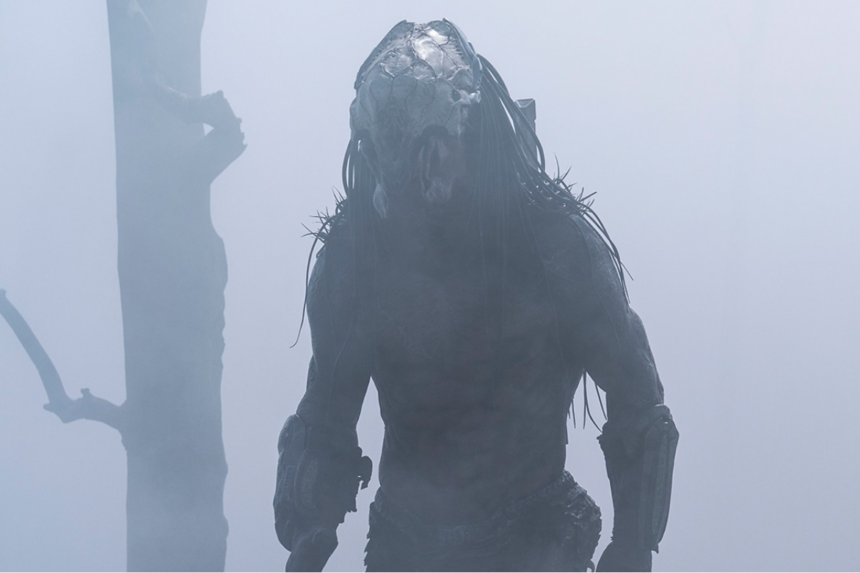Prey (2022)
Directed by Dan Trachtenberg ◆ Written by Patrick Aison ◆ Produced by 20th Century Studios ◆ Distributed by Hulu
The Ghost Goes West (1935)
Directed by René Clair ◆ Written by Robert E. Sherwood and Geoffrey Kerr ◆ Produced by London Film Productions ◆ Distributed by United Artists
Prey is a prequel to the 1987 sci-fi film Predator, starring Arnold Schwarzenegger. The premise of that film was that a race of alien warriors roams intergalactic space hunting worthy prey with advanced weaponry. Their battle abilities are terrifically enhanced by virtue of their near invisibility. When they spot Schwarzenegger leading a paramilitary platoon on a rescue mission in Central America, the aliens know they’ve found a target worthy of their fierce attention.
The 35-year-old film didn’t tell us that this alien force had paid earth an earlier visit. In director Dan Trachtenberg’s prequel, set some 300 years earlier, the predator aliens are impressed by a Comanche maiden, Naru (played by Amber Midthunder), of exceptional martial skill. Naru wields tomahawks and bows and arrows as adroitly as the male braves of her tribe, including her brother Taabe. Our dreadlocked alien warriors, the chief of whom is played by the six-foot-nine basketball player Dane DiLiegro, are fair-minded enough that they sometimes choose to hunt the Comanches with similarly primitive weaponry.
After the aliens slaughter a few Comanches, others in their scouting party deduce that they’re not up against humans but demons, and begin taking cover. Then a major complication arises. A ship of French voyageurs arrives. The aliens attack, slaughtering many of them and provoking a three-way battle that includes Naru, who finds the Frenchmen as objectionable as the aliens.
Who wins this battle royale? Foolish question. Whatever else this film is, it’s thoroughly woke. So it’s a foregone conclusion that the triumph will go to the noble savages and to their female champion, who dismembers both aliens and Frenchmen alike. Now, even on the film’s own sci-fi terms, this is ridiculous. How likely would it be for bow-and-arrow warriors to prevail in pitched battles with European adventurers armed with rifles, much less aliens armed with energy blasters? But today we live in the land of correct thinking, so of course the lovely Naru will vanquish her enemies.
Is this film worth watching? Put it this way: If you have a couple of hours to spare at home, you might stream it for its beguiling scenes of Calgary’s wilds. The beautiful, lush forests of the primary locations look quite enchanting. If you’re looking for a credible adventure narrative, however, you might want to search farther afield.
For true adventure, you can get your fill in director René Clair’s 1935 film, The Ghost Goes West, which begins in 18th-century Scotland and moves to the wilds of 20th-century Florida, with additional dangers provided by Eugene Pallette, who plays a henpecked multimillionaire whose daughter talks him into buying a Scottish Castle owned by the Glourie clan, headed by the properly aristocratic actor Robert Donat.
On a trip to Scotland, Peggy Martin (Jean Parker), daughter to the ever-irascible but nevertheless housebroken Pallette, comes across the irresistible Glourie Castle. At first sight, Peggy knows she must have it. Initially, Palette is unmoved by her clamoring, but he finally gives in on the condition that the castle be moved to some property he owns in Florida. In this plot point, Clair anticipated Orson Welles’ Citizen Kane, in which a fabulously wealthy vulgarian named Charles Foster Kane did pretty much the same thing, building his fantastic castle, Xanadu, in Florida and indiscriminately stuffing it with the art and treasures of Europe.
Clair, using Eric Keown’s short story “Sir Tristam Goes West,” entertains us with foolish Americans who completely misunderstand British history and culture. This history and culture is personified by the castle’s original owner, the 18th-century ghost Murdoch Glourie, also played by Donat with quiet wit and elegant nonchalance. Peggy falls for both the ghost and its contemporary fleshly descendant. The only question for her, and us, is how far will she fall, and with which Glourie.
The narrative abounds with parallels in manners and morals between the 18th and 20th centuries, many of which are, in our time, rather incorrect. One of the pleasures you’ll carry away is Donat’s relaxed portrait of a hero for any century. He wasn’t as handsome as Cary Grant, but he had the same engaging insouciance.



Leave a Reply